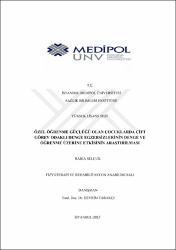| dc.contributor.advisor | Tarakçı, Devrim | |
| dc.contributor.author | Selçuk, Rabia | |
| dc.date.accessioned | 2021-06-14T12:01:58Z | |
| dc.date.available | 2021-06-14T12:01:58Z | |
| dc.date.issued | 2017 | en_US |
| dc.date.submitted | 2017-11-03 | |
| dc.identifier.citation | Selçuk, R. (2017). Özel öğrenme güçlüğü olan çocuklarda çift görev odaklı denge egzersizlerinin denge ve öğrenme üzerine etkisinin araştırılması. (Yayınlanmamış yüksek lisans tezi). İstanbul Medipol Üniversitesi Sağlık Bilimleri Enstitüsü, İstanbul. | en_US |
| dc.identifier.uri | https://hdl.handle.net/20.500.12511/7167 | |
| dc.description.abstract | Çalışmamızın amacı ÖÖG olan çocuklarda çift görev odaklı denge egzersizlerinin denge ve öğrenme üzerine etkisinin araştırılmasıdır. Çalışmaya 8-16 yaş arası ÖÖG tanısı almış 27 çocuk dahil edildi. 13 kişi çalışma ve 14 kişi de kontrol grubu olarak belirlendi. Kontrol grubu 12 hafta boyunca Milli Eğitim Bakanlığı ÖÖG Destek Eğitim Programına devam ederken çalışma grubuna ise buna ek olarak 12 hafta boyunca fizyoterapist eşliğinde çift görev odaklı denge egzersizleri yaptırıldı. Değerlendirmeler egzersiz programı öncesi ve sonrasında yapıldı. Genel denge değerlendirmesine Pediatrik Berg Denge Ölçeği ile bakıldı. Daha detaylı denge-koordinasyon değerlendirmesi farklı duysal inputların da eklendiği Tandem Yürüyüş Testi ve Parmak-Burun İzleme Testi ile yapıldı. Çift görev odaklı egzersizlerin öğrenme üzerine etkisi Öğrenme Bozukluğu Belirti Tarama Testi ile ölçüldü. Yaşam kalitesi ölçümü için Pediatrik Sağlıkla ilgili Yaşam Kalitesi İndeksi kullanıldı. Ayrıca lateralizasyon bozukluğu için dominant el-ayak-göz değerlendirmesi yapıldı. Laksite ve ayak ark yüksekliği oranı ek fiziksel problemlerin tespiti açısından değerlendirildi. İstatistiksel analizler sonucunda çalışma grubunda denge ve öğrenme üzerinde anlamlı gelişme bulunmuştur (p<0,05). Özellikle okul sorunları, yaşam kalitesi değerlendirmesinde dikkat çekici oranda düşük çıkmıştır. Çocukların yarıya yakınında lateralizasyon bozukluğu tespit edilmiş fakat bunun öğrenme üzerindeki etkisine bakılmamıştır. Ayrıca çocukların yarısında laksite ve orta derece pes planusun eşlik ettiği görülmüştür. Çalışmanın sonunda, denge-koordinasyon ve motor problemler yaşayan ÖÖB tanılı çocuklarda kognitif ve duysal olarak zenginleştirilmiş denge egzersizlerinin önemi vurgulanmıştır. ÖÖB tanılı çocukların fizyoterapi açısından değerlendirilmesinin önemi ve uygun müdahalelerin yapılması gerektiği ortaya çıkartılmıştır. | en_US |
| dc.description.abstract | The purpose of this study is to research the effect of dual-task balance exercises on balance and learning in children with SLD. A total of 27 children diagnosed with SLD with their age ranging between 8-16 years were included into the study. 13 subjects were identified as the study group, and 14 subjects as the control group. While the control group attended the SLD Support Training Program of the Turkish Ministry of National Education for 12 weeks, the study group performed dual-task balance exercises in the accompaniment of a physiotherapist for 12 weeks in addition to the mentioned training program. Evaluations were performed before and after the exercise program. Berg's Pediatric Balance Scale was employed for overall balance assessment. A more detailed balance-coordination assessment was performed using the Tandem Gait Test and Finger-to-Nose Test by the addition of diverse sensory inputs. The effect of dual-task exercises on learning was measured by means of a Learning Disorder Symptoms Screening Test. The Life Quality Index relevant for Pediatric Health was used to measure life quality. Furthermore, dominant hand-foot-eye evaluations were carried out to assess lateralization disorders. Laxity and foot arch height rates were evaluated in order to identify any additional physical problems. Statistical analyses delivered significant development on balance and learning in the study group (p<0,05). Especially school problems were found to be remarkably low in the life quality assessment. Lateralization disorders were identified in almost half of the children, but the impact thereof on learning was not examined. Besides, it was seen that in half of the children this was accompanied by laxity and moderate pes planus. As result of the study, the importance of cognitive and sensory-enriched balance exercises in children diagnosed with SLD suffering from balance, coordination and motor problems was emphasized. The study revealed the importance of evaluating children diagnosed with SLD with an eye to physiotherapy and the necessity to carry out adequate interventions. Keywords: Balance, Laxity, Lateralization, SLD, Life Quality. | en_US |
| dc.language.iso | tur | en_US |
| dc.publisher | İstanbul Medipol Üniversitesi Sağlık Bilimleri Enstitüsü | en_US |
| dc.rights | info:eu-repo/semantics/openAccess | en_US |
| dc.subject | Denge | en_US |
| dc.subject | Laksite | en_US |
| dc.subject | Lateralizasyon | en_US |
| dc.subject | ÖÖB | en_US |
| dc.subject | Yaşam Kalitesi | en_US |
| dc.subject | Balance | en_US |
| dc.subject | Laxity | en_US |
| dc.subject | Lateralization | en_US |
| dc.subject | SLD | en_US |
| dc.subject | Life Quality | en_US |
| dc.title | Özel öğrenme güçlüğü olan çocuklarda çift görev odaklı denge egzersizlerinin denge ve öğrenme üzerine etkisinin araştırılması | en_US |
| dc.title.alternative | Research on the effect of dual-task balance exerciseson balance and learning in children with specificlearning disabilities | en_US |
| dc.type | masterThesis | en_US |
| dc.department | İstanbul Medipol Üniversitesi, Sağlık Bilimleri Enstitüsü, Fizyoterapi ve Rehabilitasyon Ana Bilim Dalı | en_US |
| dc.relation.publicationcategory | Tez | en_US |


















